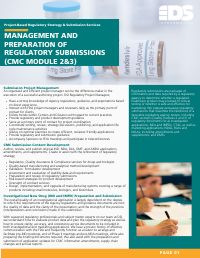Regulatory submissions are packages of information and data required by a regulatory agency to determine whether a regulated healthcare product may proceed to clinical testing or whether is safe and effective for marketing. We prepare persuasive regulatory submissions that maximize the likelihood of a favorable regulatory agency review, including CMC sections (Quality modules 2 and 3) of regulatory documents for al investigation applications; INDs and IMPDs, CTAs, as well as marketing applications; NDAs, BLAs and MAAs; including amendments and supplements; and DMFs.
Submission Project Management
An organized and efficient project manager can be the difference maker in the execution of a successful authoring project. DSI Regulatory Project Managers;
- Have a strong knowledge of Agency regulations, guidance and expectations based on direct experience,
- Interact with FDA project managers and reviewers daily as the primary point of contact for clients
- Follow trends within Centers and Divisions with regard to current practices
- Provide regulatory and product development guidance
- Serve as a primary point of contact for project coordination
- Coordinate writing, review, strategy discussions, publishing and application life cycle maintenance activities
- Advise on optimal practices to create efficient, reviewer friendly applications
- Provide regulatory and submission guidance
- Accompany Sponsors to FDA meetings and participate in teleconferences
CMC Submission Content Development
Author, review and publish original IND, NDA, BLA, DMF, and ANDA applications, amendments and supplements. Create or assist with the refinement of regulatory strategy;
- Regulatory, Quality Assurance & Compliance services for drugs and biologics
- Quality-based manufacturing and analytical method development
- Validation
- Formulation development
- Assessment and evaluation of stability data and requirements
- Preparation and review of regulatory submissions
- Risk-based strategies for product development
- Oversight of contract services
- Design, implementation and upgrade of manufacturing systems covering a range of products including small molecules, biologics and biosimilars
Investigational New Drug (IND and IMPD) Preparation and Submission
The overall quality of an investigational application is largely dependent on the degree to which the requirements of the Agency regulations and guidance documents are met; the quality of data and the clarity of the presentation; and the strength of the positions (interpretations and conclusions) made in the submission.
With seasoned regulatory professionals and subject matter experts on our team at DSI, we understand how to evaluate product data and plan the regulatory strategy as well as how to ensure clarity, accuracy and consistency across documents to be included in both investigational and marketing applications. We have a proven history of effective communication with the FDA and frequently function as a liaison to arrange and facilitate pre-IND meetings, end of Phase II meetings and pre-NDA meetings, while also preparing the briefing documents required. We also assist with the preparation and submission of application updates for CMC information amendments, supply chain changes and annual reports.
New Drug Application (NDA) 505(b)(1) Preparation and Submission
DSI’s integrated regulatory solutions are designed to enhance the quality, organization and completeness of Agency applications. At every stage, we ensure that four key criteria are met:
- Inclusion of adequate data, together with effective interpretation of both compliance and conformance data, to support product approval
- Compliance with applicable FDA regulations and guidance
- FDA reviewer requirements are met
- CTD submissions fully conform with specifications
New Drug Application (NDA) 505(b)(2) Preparation and Submission
Based on our success with 505(b)(2) submissions, our distinctive process for these applications is one of the most efficient and effective in the industry. The nature of the 505(b)(2) and the fact that the CMC information required is identical to that of the 505(b)(1) allows for the harmonization of any marketing application. DSI’s demonstrated success with this type of application derives from our detailed knowledge of the filing requirements, and the use of established and well-accepted methodologies in drug development.
Biologic License Application (BLA) Preparation and Submission
DSI’s integrated regulatory solutions are designed to enhance the quality, organization and completeness of biological applications. At every stage, we ensure that four key criteria are met:
- Inclusion of adequate data, together with effective synthesis and interpretation of data, to support product approval
- Compliance with applicable regulations and guidance for biologics
- FDA reviewer requirements are met
- CTD submissions fully conform with specifications
Abbreviated New Drug Application (ANDA) 505(j) Submissions
DSI’s strategic approach to successful ANDA submissions focuses on gathering the appropriate ANDA information to ensure a complete application while generating and collecting the right data. We rely on decades of experience to minimize compliance uncertainly.
Complex Drug Product Preparation and Submissions
What Are Complex Generic Products? The FDA defines complex generic drug products as:
- “Products with complex active ingredients (e.g., peptides, polymeric compounds, complex mixtures of [active pharmaceutical ingredients], naturally sourced ingredients); complex formulations (e.g., liposomes, colloids); complex routes of delivery (e.g., locally acting drugs such as dermatological products and complex ophthalmological products and dosage forms that are formulated as suspensions, emulsions, or gels); or complex dosage forms (e.g., transdermals, metered dose inhalers, extended-release injectables);
- Complex drug-device combination products (e.g., auto-injectors, metered dose inhalers); and
- Other products where complexity or uncertainty concerning the approval pathway or possible alternative approach would benefit from early scientific engagement.”



